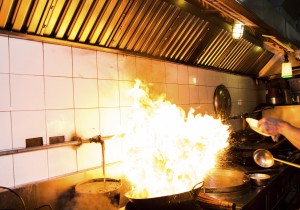
Keep your commercial kitchen safe by knowing the dangers it poses.
According to a 2012 report by the NFPA, there was a total of 7,640 structural fires in eating and drinking establishments between 2006 and 2010. Luckily, these fires only caused two civilian deaths and 115 civilian injuries. But they also caused $246 million dollars in damage and many of the businesses were forced to close their doors for good. While many people think these fires were caused by an out of control fire, there are actually many different causes of kitchen fires. Read on to find out how your kitchen could be risking your business.
Fryers
Fryers are one of the most obvious causes of commercial kitchen fires. Deep fryers can quickly become a vat of fire fuel if proper precautions are not taken. To protect your employees and your business, your fire should be placed at least 16 inches from any equipment with an open flame like a stove top or range. If your kitchen’s size does not allow for a 16-inch distance, use a noncombustible dividing wall to stop splashes from coming into contact with the open flame. Your fryers should also be equipped with an automatic shut-off valve in case the unit catches on fire. This valve will stop the flow of combustible fuel from feeding the flames.
The Oven
Your oven is used every day, but when was the last time it was cleaned properly? Commercial ovens should be cleaned regularly for not only health safety but for fire protection as well. A dirty oven could have a buildup of combustible substances in it. Your oven should also be placed away from other equipment to avoid heat transfer from one to the other. Any item used in your oven should be cleaned along with it and should be made of noncombustible materials like metal.
Hood and Ventilation Systems
According to NFPA code 96, every commercial kitchen must have a hood and ventilation system to prevent fire. A hood and ventilation system should be cleaned often to prevent buildup from accumulating on the outside and inside of your system. The hood should cover your entire cooking station including the ovens and fryers. It should also be structurally sound and made of a noncombustible material, usually steel. These systems should be cleaned and maintained regularly to keep them free of greasy buildup. Every vent should have a grease filter properly installed and that can be easily removed for cleaning. Grease traps on your commercial hood should drain into a non-flammable metal container that is emptied regularly and safely.
Trash Cans
While it may seem like having a trash can right next to the oven is a great idea, this placement could mean danger if the can is not made out of a noncombustible material. A plastic trash can could quickly turn into fuel for a fire. Your trash can should also be emptied regularly to prevent the accumulation of fire fodder and be kept at a safe distance from open flames. Every trash can should also be equipped with a sturdy lid to keep its contents from becoming fuel in the event of a fire.
By following these rules and having a top-notch fire suppression system installed, your commercial kitchen and business will remain safe. For more information on upgrading your commercial fire system or on commercial fire safety, call Fireline today!
Common Fire Hazards of Commercial Kitchen Fires with Fireline
At Fireline, we offer an array of portable fire extinguishers, fire alarms, and sprinkler systems to keep commercial kitchens safe. Fireline offers the highest quality alarm systems to keep your business safe from fires and carbon monoxide poisoning. We also offer fire suppression systems as well to help keep commercial fires controlled should they break out. Our trained technicians will work with you to determine which air sampling smoke detection system is best for your business. We will also help install and maintain the system for your commercial building.
To get started with Fireline today, or for more information on sprinkler systems call us at 1-800-553-3405, or visit our contact page.
Be sure to “Like” and “Follow” the official Fireline page today on Google+, Facebook, Twitter, and LinkedIn.
